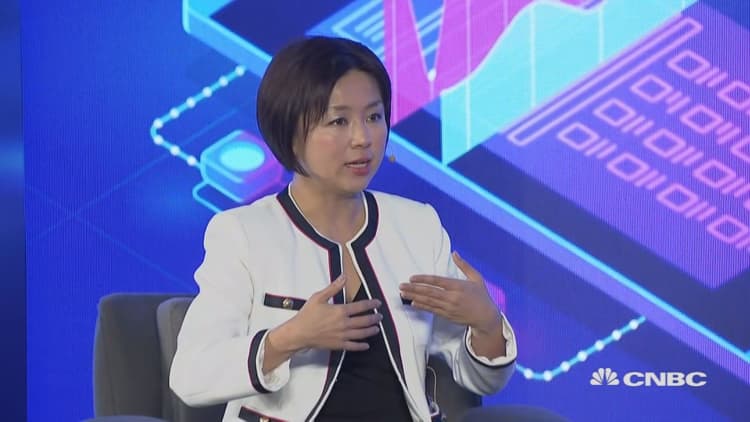
China has a "love-hate relationship" with cryptocurrency and the blockchain with many in the country seeing significant opportunities in the latter, Edith Yeung, head of 500 Startups' China unit, told CNBC Tuesday.
The craze of cryptocurrencies has swept across the globe in the last few years as the price of digital coins, like bitcoin, soared and then fell dramatically. Many critics have poured scorn on the volatility of the currencies and their lack of government regulation.
But many have spoken favorably of the blockchain, which is the public ledger behind some of these currencies, including bitcoin. The blockchain has won plaudits because it cannot be tampered with or changed retrospectively. Advocates of the technology say this makes bitcoin transactions secure and safer than current system.
Speaking to CNBC's Eunice Yoon at East Tech West in the Nansha district of Guangzhou, China, Yeung said the Chinese government is investing in the blockchain but said "what they are not endorsing is the crypto part of things, which is challenging the fundamental of financial systems."
She made the comments when asked what the strategy was for cryptocurrency in China, after the government banned cryptocurrency exchanges and initial coin offerings (ICOs) there in September 2017, marking the start of a crackdown on digital currency in the country.
The China Internet Report, created by Yeung, further details how China wants to be a frontrunner in blockchain technology despite the crypto ban. It says that Shanghai, Shanxi, Henan, Guangzhou, Guiyang and Hangzhou have all issued policies to encourage blockchain development.
New funding has come from Shenzhen, after it established a 500 million ($71.9 million) yuan fund for blockchain investments. Hangzhou also announced plans to invest 10 billion yuan in a blockchain fund. The sector also has central government support from President Xi Jinping who ordered the use of blockchain technologies to create a smart city for the Xiongan New Area economic zone.
Blockchain start-ups are also seeing investment growth. The report highlights that the 41 percent of new Chinese companies that received funding in the first quarter of 2017 were blockchain-related.
Blockchain potential
Speaking at East Tech West, Yeung said the kind of blockchain companies that have potential in China are those more on the enterprise side of things.
"I was looking at a user case where they were trying to certify diamonds. Diamonds come from one place and you pass it (on) ... you wanna make sure that it's real jewelry for us," she explained. "I think there is a lot of really practical use cases the whole world can use blockchain for," she said.
Yeung's report also highlights more examples where blockchain can be applied across industries, including health care, logistics, identity management, and digital asset tracking.
China's big internet giants — Baidu, Alibaba, and Tencent — collectively known as BAT in the industry, are also all building or investing in the blockchain, the report shows. It sets out some recent examples, including Alibaba's partnership with the city of Changzhou in August 2017 to launch China's first application of blockchain technology in the medical sector.
While Tencent partnered with the China Federation of Logistics & Purchasing in March 2018 to develop an industry application based on the Tencent blockchain — TrustSQL.




